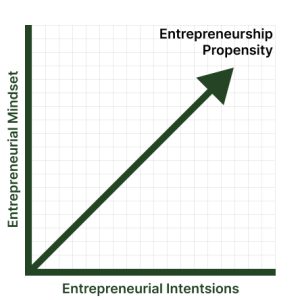
A Definition of High Entrepreneurship Propensity
Entrepreneurship Propensity (EP) is based on an individual’s entrepreneurial mindset and their entrepreneurial intentions. A person with high levels of entrepreneurship propensity believes that they
The Ubuntu Entrepreneurship Propensity Index (EPI) is designed to enable the measurement of youth Entrepreneurship Propensity (EP) and New Venture Creation (NVC) potential, through the collection of consistent and comparable data, to thereby inform entrepreneurship development interventions.
At the genesis of entrepreneurship propensity is one’s entrepreneurial mindset (optimism, commitment, determination, motivation and need to achieve) and their entrepreneurial intentions are underpinned by (sense of purpose, self-efficacy, opportunity identification and action orientation). Entrepreneurship propensity (mindset and intentions) lead to the attainment of entrepreneurial skills and experience through the process of new venture creation. An entrepreneur’s skills and experience continue to grow as they continue along their entrepreneurial journey, creating a compounding effect which results in entrepreneurial mastery.
The Ubuntu Entrepreneurship Propensity Index:

High EPI scores suggest that an individual demonstrates the personality profile of a successful entrepreneur and requires help in unlocking their entrepreneurial potential. The support required by these individuals is fundamentally different to that of low to medium levels of EP. Interventions used to support high EP individuals are based on coaching and mentoring entrepreneurs through programmes, largely aimed at empowering them with the skills, knowledge, tools and experience they need to become successful entrepreneurs.
Low EPI scores suggest the need to develop an individual’s entrepreneurial mindset and entrepreneurial intentions. The support required for low EPI scores is based on helping individuals to believe that they are in control of their successes in life and that external factors (and their personal circumstances) do not determine their future. The goal of such interventions is to improve EPI scores by developing self-confidence, self-belief, and self-motivation in relation to entrepreneurship, while strengthening an individual’s entrepreneurial mindset.

Entrepreneurship Propensity (EP) is based on an individual’s entrepreneurial mindset and their entrepreneurial intentions. A person with high levels of entrepreneurship propensity believes that they

Based on the systemic (intrinsic and extrinsic) nature of entrepreneurship, there remains a need for interventions related to niche policies and programmes to encourage NVC.

Intrinsic entrepreneurship propensity is based on an individual’s predisposition towards entrepreneurship and their likelihood to persist through the setbacks and failures that are inherent in the entrepreneurial process.

The human capital aspects of an entrepreneurship ecosystem rely on education, which is vitally important to address the unemployment crisis in the country. The South

Informal new venture creation is based on entrepreneurship activity that is executed in the informal sector1. In this type of NVC, the motivation behind starting

Research has shown that entrepreneurs are different from non-entrepreneurs and that there is a need for to recognise the diversity among entrepreneurs and their new

A system can be described as being in a certain state, containing “stock”, with inflows (new ventures) and outflows (business failures). At any given time,

We have developed an effective method through which to measure entrepreneurship propensity and determine new venture creation potential, which is based on several years of

South Africa is faced with increasing rates of unemployment which are generally more pronounced in middle-income countries. The youth in particular are facing severe unemployment
There was a problem reporting this post.
Please confirm you want to block this member.
You will no longer be able to:
Please note: This action will also remove this member from your connections and send a report to the site admin. Please allow a few minutes for this process to complete.

